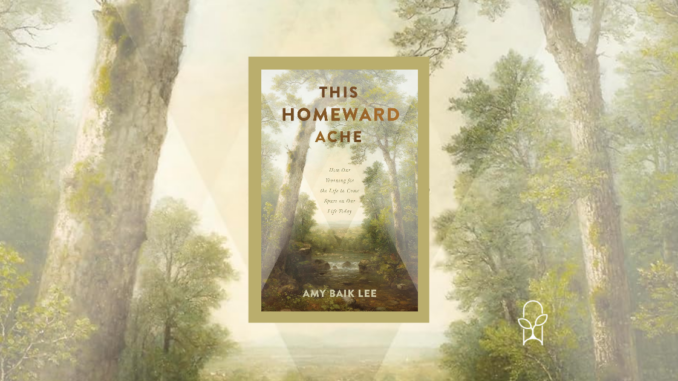
Published by B&H Publishing on September 26, 2023
Genres: Non-Fiction, Christian Life, Memoir
Buy on Amazon
Goodreads

That sudden yearning you feel when you see a sunset. That pang of longing you sense deep in your bones when you attend a funeral or even gaze at a poignant piece of art. Those experiences that sting you to attention in moments of beauty, peace, or sorrow—the ones you can sense are offering you a twinkling, piercing hint of heaven:
Are these meant to do more than point you to eternity?
What if they could enable you to live more fully on the way there?
Through personal reflections, evocative stories, and profound writing, author Amy Baik Lee offers This Homeward Ache, inviting you to remember the times you've been deeply moved by a glimpse, a spark, of something you know is beyond the visible present—moments that other cultures and times have called Sehnsucht, saudade, hiraeth, or galmang. In each spellbinding chapter, Amy traces her own brushes with this longing, unfolding her discovery that it is designed to enrich and alter every area of our lives: our valleys of pain, our relationships with other people, and ultimately our reception of the love of God.
If you’ve ever wondered how to keep going in this world while holding on to the hope of the world to come, This Homeward Ache offers you courage, companionship, and a stirring sense of the scope of our journey home to Christ.
This poignant, unique book is about the sensation of longing that so many of us feel when we experience beauty. Amy Baik Lee explores this concept from multiple angles throughout the book, exploring how different cultures define and explain it, how it is different from other feelings, and what it means for Christians to experience these sparks of beauty and the yearning that comes with them. Baik Lee reflects on the ways that our experience of beauty here on earth points us to a heavenly kingdom, and she shares stories and reflections about the role of beauty and longing in her own life and faith.
Baik Lee reflects on a number of different topics and life experiences, exploring what her “homeward ache” has meant to her in the midst of pain and suffering, changing definitions of home, and her work as a creative writer. Some chapters in this book are incredibly poignant, such as the one about her move to South Korea as a teenager, coping with culture shock and a stark feeling of not belonging in a place that was home for many of her family members. She also writes beautifully about her recent experience exploring her family history and facing the limits of what she can know:
“But I find deep consolation in the fact that the Creator of this universe knows all the traits of the people groups he created. He holds their stories. He knows the name of every family that was torn in two when the Korean War ended and the peninsula was divided in half; he knows who among my relatives I will meet for the first time in eternity. All the unrecorded details I wonder about in the Bible, all the family tales I have never heard–he remembers them all, and thousands more besides.”
Parts of this book are moving and profound, and that chapter was one of my favorites. However, because this book is very personal and subjective, it will not resonate with everyone. There are some chapters that stand well on their own and have a clear, stirring message, while others have a less clear focus and are mainly about the author’s internal experiences. People who relate to her will get far more out of this than people who have different personalities and life experiences.
For example, I respond to nature’s beauty in much the same way as the author, relate to her experiences with literature and the arts, and have my own emotional ties with three of the places where she has lived. Her detailed descriptions and reflections meant a lot to me because I’ve been there, and because I feel the same way, but people with different experiences won’t connect as much. The “homeward ache” is a mostly universal feeling, but not everyone will experience or process it the same way.
My biggest concern is that the author doesn’t intentionally make room for people with different personalities. She never says that less emotional people are broken or spiritually deficient, but the more that she highlighted her intense experience of beauty and longing as a core part of her faith, the more concerned I became. If someone doesn’t have strong, deeply felt reactions to things, this book might make them feel like there’s something wrong with them, when they really just have a different temperament. Also, because the author doesn’t explicitly warn against this, people who relate to her may misuse this book to judge others, thinking that someone with a different personality lacks kingdom-minded faith.
This Homeward Ache: How Our Yearning for the Life to Come Spurs on Our Life Today is a thoughtful, reflective, and highly subjective book about the role of longing and deep emotions in the Christian faith. The author explores the deeper meaning behind a common human experience, explaining how this bittersweet feeling can reveal spiritual truths and point us to our heavenly future. I enjoyed this book and related to it a lot, but its true audience is narrower than the subtitle implies. I would recommend this to other people who are highly sensitive and like to reflect on their intense emotions, but people with different personalities should be aware that a lot of this may not resonate with them.
